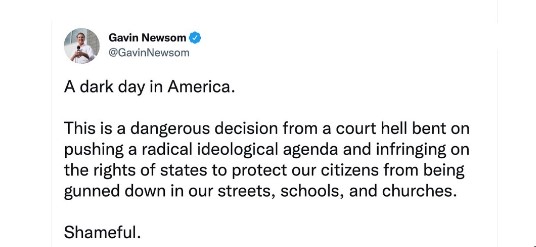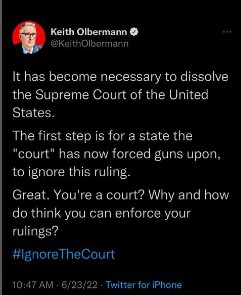“I have called upon and am working closely with our Attorney General to identify what’s going on on social media, and those questions are now part of our background checks. So, just like in the old days, you’d talk to someone’s neighbor. Now you can talk to their neighbors online and find out whether or not this person has been spouting philosophies that indicate that they have been radicalized. And that’s how we protect our citizens as well.”
New York Governor Kathy Hochul made these comments at a press conference on August 24. Hochul is referring to her state’s new law which requires applicants for gun licenses to provide their social media usernames so that police can ensure that the content of their posts is acceptable before issuing a license.
These comments are disturbing for several reasons:
First, the use of the word “radicalized” presumes that radical views are something that originates outside of a person, as opposed to from within. It follows from this presumption that radical views are bad and wrong. After all, if certain beliefs can only come to be held due to outside influences, and not due to thoughtful, deliberate reflection, then those beliefs must be irrational and incorrect. But there is nothing inherently bad about radical views, and they are just as likely to be correct as moderate ones. A person can come to hold radical views through careful deliberation, just as a person can come to hold moderate views through such deliberation. In fact, one could argue that radical views are more, not less, likely than moderate ones to be a result of philosophical reasoning and analysis.
Second, it is deeply wrong to base permission to exercise fundamental rights on whether or not a person’s views are considered acceptable. According to Hochul, if an applicant has been “spouting philosophies that indicate that they have been radicalized,” then that is reason to deny their application. In other words, Hochul believes that exercise of Second Amendment rights should be limited to people whose views are deemed sufficiently mainstream and moderate. This is, to put it bluntly, absurd. Holding radical views is absolutely not a valid reason for denial of a gun license. As explained above, whether a person’s views are radical or moderate has nothing to do with whether those views are right or wrong. But beyond that, people’s philosophies, beliefs, and views should have no bearing whatsoever on whether their gun license applications are granted, because people’s philosophies, beliefs, and views are none of the government’s business. Even if an applicant holds beliefs that are completely and utterly wrong, that is no reason to deny them the ability to exercise fundamental rights.
Third, by conditioning the granting of Second Amendment rights on the acceptability of people’s social media posts, Hochul is treating these rights not as rights at all, but as privileges. Gun ownership is a fundamental right. In criminal law, people are presumed innocent until proven guilty, because the consequence of being found guilty is for the person’s freedom to be taken away. Similarly, denying a person permission to own and carry a gun takes away a fundamental freedom. Therefore, decisions with regard to gun ownership must use the presumption of innocence standard as well: as long as the government does not have proof that a particular person is unfit to hold a license, the government has a moral obligation to issue the license. Applying for a gun license should not be treated like applying for a job. This is not a situation in which the government can set any standards that it wants and restrict licenses to only the applicants who meet those standards. The government should not be investigating or evaluating a person’s reputation, statements, philosophies, or beliefs, whether by talking to neighbors or by viewing social media profiles. To view rights as something that should be granted only if a person passes these evaluations is to view rights as privileges. And rights are not privileges; they are rights.
In conclusion, Hochul demonstrates two highly disturbing and false assumptions: First, that when it comes to political and moral philosophies, moderate equals good and radical equals bad. Second, that the ability to exercise gun rights should be conditioned on whether or not a person holds “good” political and moral philosophies. Not only is it authoritarian to restrict freedoms to people who hold the correct views, but it is even more authoritarian to presume that the correctness of someone’s views is a function of how popular and widely held those views are. Yet this is exactly what Hochul is doing. The purpose of the Bill of Rights is to protect the rights of minorities against a tyrannical, bullying majority. By openly stating that the expression of unusual views is a legitimate reason to deny a person rights, Hochul is completely defeating the entire purpose of the Bill of Rights and completely disregarding the concept of individual liberty. It is beyond disturbing that any public official would demonstrate such mindless conformity, such moral bankruptcy, and such disrespect for people who think differently than she does, as Hochul has demonstrated through her public statements. It is not okay for the government to limit rights to only those people whose philosophies it has deemed acceptable.
P.S. Although this is not directly relevant to the topic of this blog post, I would be remiss not to mention Hochul’s recent decision to order all Republicans to leave her state. “Just jump on a bus and head down to Florida where you belong,” she said at a campaign rally. “You are not New Yorkers.” Needless to say, these appalling comments are additional evidence of Hochul’s bigotry and intolerance towards people who think differently than she does. So much for progressivism being the philosophy of tolerance, diversity, and inclusion.




